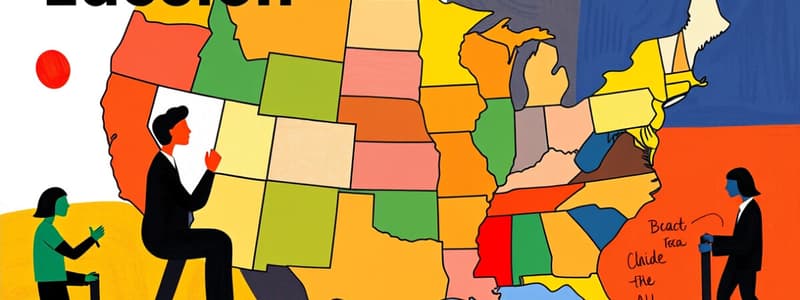Podcast
Questions and Answers
During which era were children with disabilities perceived as being punished by the Gods, leading to perceptions of their extermination?
During which era were children with disabilities perceived as being punished by the Gods, leading to perceptions of their extermination?
- Renaissance
- Middle Ages
- Greek and Roman (correct)
- Ancient
How were children with special needs treated during the Middle Ages according to historical perspectives?
How were children with special needs treated during the Middle Ages according to historical perspectives?
- They were integrated into society and accepted.
- They were adored and celebrated for their uniqueness.
- They were subjected to ridicule and forced into performances. (correct)
- They received comprehensive education and support.
What was a prominent characteristic of the Renaissance period regarding children with special needs?
What was a prominent characteristic of the Renaissance period regarding children with special needs?
- They were treated with cruelty and disdain.
- They received humane treatment but continued to be isolated. (correct)
- Children were exterminated for being deemed imperfect.
- They were increasingly included in educational systems.
What brutal methods were employed during the Greek and Roman era for dealing with children perceived as having disabilities?
What brutal methods were employed during the Greek and Roman era for dealing with children perceived as having disabilities?
Which term best describes the Children with special needs' treatment in the Ancient period?
Which term best describes the Children with special needs' treatment in the Ancient period?
Who is known as the Father of Special Education for his work with Victor, the wild boy of Aveyron?
Who is known as the Father of Special Education for his work with Victor, the wild boy of Aveyron?
Which educator is recognized for founding the American School for the Deaf?
Which educator is recognized for founding the American School for the Deaf?
What significant case addressed the issue of accessing public education for children with intellectual disabilities?
What significant case addressed the issue of accessing public education for children with intellectual disabilities?
During which era were several laws enacted due to litigation in special education?
During which era were several laws enacted due to litigation in special education?
Which prominent figure documented the development of Victor and is known for sensory and motor training?
Which prominent figure documented the development of Victor and is known for sensory and motor training?
Flashcards are hidden until you start studying
Study Notes
History of Special Education
- Special education history varies by source; Tremblay's adaptation categorizes it into six eras.
Ancient Era (Before Christ)
- Children with special needs viewed as supernatural: either demons or gods.
- Execution of those with disabilities; exceptional children glorified.
- Mild conditions led to survival but isolation continued.
Greek and Roman Era
- Known as the Era of Extermination, infanticide was common for children with disabilities.
- Disability seen as divine punishment, leading to lack of hope for improvement.
- Methods of extermination included chaining, drowning, and abandonment by fathers.
Middle Ages
- Characterized as the Era of Ridicule; children were mocked and marginalized.
- Individuals with disabilities treated as servants or fools; forced to perform as clowns.
- Discrimination led to social isolation and violence against the disabled.
Renaissance
- Named the Era of Asylum; care was improved, but disabilities remained treated harshly.
- Continuous belief in disabilities as permanent conditions, with no potential for improvement.
- Catholic charities often acted as wards for children with special needs.
Industrial Revolution
- Era of Education emerged with significant efforts to educate children with disabilities.
- Key figures:
- Jean Marc Gaspard Itard: Known as the Father of Special Education; pioneered multisensory learning.
- Edouard Seguin: Documented development of Itard's pupil, Victor; focused on sensory and motor training.
- Maria Montessori: Developed discovery learning and the use of actual materials for education.
- Elizabeth Farrell: Founded the Council for Exceptional Children; initiated public school programs for special needs.
- Samuel Gridley Howe: Established Perkins Institution for the Blind, the first school for visually impaired children in the USA.
- Thomas Hopkins Gallaudet: Founded the American School for the Deaf, married a deaf student.
Turn of the Century (1900s)
- Known as the Era of Litigation and Legislation; significant legal cases influenced special education.
- Emphasis on the medical model, regarding disabilities as biological or physical impairments.
- Establishment of specialized schools for children with intellectual disabilities, blindness, and deafness.
Significant Litigations and Legislations in Special Education (USA)
- Legal developments paved the way for protections against discrimination in education.
- Brown vs Board of Education of Topeka, Kansas (1954): Challenged school segregation, addressing racial inequality.
- PARC vs Commonwealth of Pennsylvania (1972): Advocated for free public education for children with intellectual disabilities.
Studying That Suits You
Use AI to generate personalized quizzes and flashcards to suit your learning preferences.




